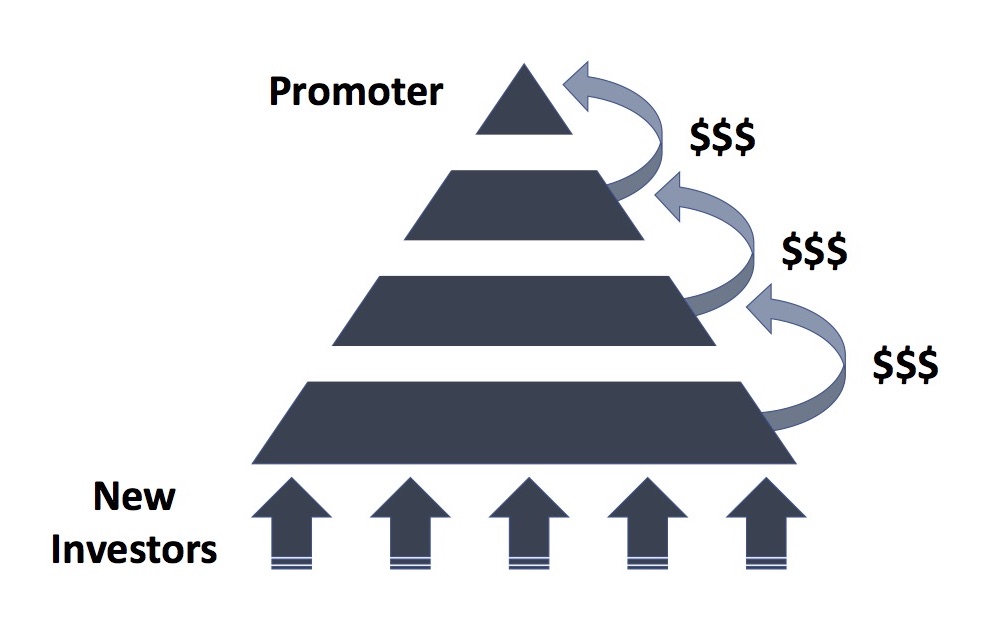A ponzi scheme is thought about a deceitful financial investment program. It includes utilizing payments collected from new investors to settle the earlier financiers. The organizers of Ponzi plans typically guarantee to invest the money they collect to generate supernormal earnings with little to no threat. Nevertheless, in the real sense, the fraudsters don't actually plan to invest the cash.
When the brand-new entrants invest, the cash is collected and used to pay the original financiers as "returns."However, a Ponzi scheme is not the like a pyramid scheme. With a Ponzi scheme, investors are made to believe that they are making returns from their financial investments. On the other hand, participants in a pyramid scheme are conscious that the only way they can make revenues is by recruiting more individuals to the scheme.
Red Flags of Ponzi Schemes, Most Ponzi schemes included some common attributes such as:1. Pledge of high returns with minimal threat, In the real world https://gust.com/companies/tyler-tysdal, every financial investment one makes carries with it some degree of danger. In reality, financial investments that use high returns normally carry more risk. So, if someone uses a financial investment with high returns and couple of risks, it is most likely to be a too-good-to-be-true deal.
Ponzi Scheme Wiki
2. Overly consistent returns, Investments experience variations all the time. For instance, if one purchases the shares of a provided business, there are times when the share rate will increase, and other times it will decrease. That stated, financiers ought to always be hesitant of investments that generate high returns consistently no matter the fluctuating market conditions.
Unregistered investments, Before hurrying to purchase a scheme, it is necessary to verify whether the investment firm is registered with U.S. Securities and Exchange Commission (SEC)Securities and Exchange Commission (SEC) or state regulators. If it's signed up, then an investor can access details relating to the company to determine whether it's legitimate.
Unlicensed sellers, According to federal and state law, one must possess a specific license or be registered with a regulating body. A lot of Ponzi schemes handle unlicensed people and companies. 5. Deceptive, sophisticated methods, One should prevent financial investments that include procedures that are too complicated to understand. History of the Ponzi Scheme, The scheme got its name from one Charles Ponzi, a fraudster who deceived thousands of investors in 1919.
Ponzi Scheme 2010
Back in the day, the postal service provided global reply discount coupons, which allowed a sender to pre-purchase postage and include it in their correspondence. The recipient would then exchange the discount coupon for a concern airmail postage stamp at their home post office. Due to the changes in postage costs, it wasn't unusual to discover that stamps were more expensive in one nation than another.
He exchanged the discount coupons for stamps, which were more costly than what the coupon was initially purchased for. The stamps were then cost a greater cost to make a profit. This type of trade is referred to as arbitrage, and it's not illegal. Nevertheless, at some time, Ponzi became greedy.
Provided his success in the postage stamp scheme, nobody questioned his intents. Unfortunately, Ponzi never really invested the cash, he simply raked it back into the scheme by paying off a few of the investors. The scheme went on until 1920 when the Securities Exchange Company was examined. How to Safeguard Yourself from Ponzi Schemes, In the exact same method that an investor researches a business whose stock he's about to acquire, a person should examine anybody who helps him manage his financial resources.
What Is Ponzi Scheme Named After

Likewise, prior to purchasing any scheme, one should request for the company's financial records to validate whether they are legitimate. Key Takeaways, A Ponzi scheme is just a prohibited financial investment. Named after Charles Ponzi, who was a scammer in the 1920s, the scheme assures constant and high returns, yet supposedly with really little threat.
This type of scams is named after its creator, Charles Ponzi of Boston, Massachusetts. In the early 1900s, Ponzi launched a scheme that guaranteed financiers a 50 percent return on their investment in postal vouchers. Although he had the ability to pay his preliminary backers, the scheme dissolved when he was not able to pay later financiers.

What Is a Ponzi Scheme? A Ponzi scheme is a deceptive investing scam promising high rates of return with little danger to investors. A Ponzi scheme is a fraudulent investing rip-off which produces returns for earlier investors with money taken from later investors. This is similar to a pyramid scheme in that both are based on utilizing new investors' funds to pay the earlier backers.
Ponzi Scheme Us
When this circulation runs out, the scheme breaks down. Origins of the Ponzi Scheme The term "Ponzi Scheme" was coined after a trickster called Charles Ponzi in 1920. Nevertheless, the first taped instances of this sort of financial investment scam can be traced back to the mid-to-late 1800s, and were managed by Adele Spitzeder in Germany and Sarah Howe in the United States.
Charles Ponzi's original scheme in 1919 was focused on the United States Postal Service. The postal service, at that time, had developed worldwide reply coupons that enabled a sender to pre-purchase postage and include it in their correspondence. The receiver would take the voucher to a local post office and exchange it for the top priority airmail postage stamps needed to send out a reply.
The scheme lasted up until August of 1920 when The Boston Post began examining the Securities Exchange Business. As a result of the newspaper's examination, Ponzi was jailed by federal authorities on August 12, 1920, and charged with numerous counts of mail scams. Ponzi Scheme Warning The principle of the Ponzi scheme did not end in 1920.
Ponzi Scheme Online
Ty Tysdal Reports on on The Web
Type of financial scams 1920 picture of Charles Ponzi, the namesake of the scheme, while still working as a business person in his workplace in Boston A Ponzi scheme (, Italian:) is a form of scams that draws investors and pays revenues to earlier investors with funds from more recent financiers.
No comments:
Post a Comment